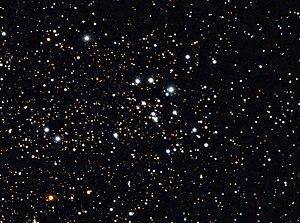M18 (疏散星團)
外观
| M18(梅西耶18) | |
|---|---|
 人馬座的疏散星團。 | |
| 觀測資料 (J2000.0 曆元) | |
| 赤經 | 18h 19m 58.0s[1] |
| 赤緯 | –17° 06′ 06″[1] |
| 距離 | 4.23 kly(1.296 kpc)[2] |
| 視星等 (V) | 7.5[3] |
| 視大小 (V) | 9.8′[4] |
| 物理特徵 | |
| 質量 | 186+161 −86[5] M☉ |
| 半徑 | 26.2光年[5] |
| 估計年齡 | 33×106 年[6] |
| 其他特徵 | 梅西耶 18, NGC 6613, Cr 376, OCl 40[7] |
M18或梅西耶18,也稱為NGC 6613,是在人馬座的一個疏散星團。 它是梅西耶在1764年發現,並被列入它的類似彗星天體的清單中[8]。從地球的位置來看,M18位於歐米茄星雲和人馬座恆星雲(M24)之間[3]。
這是一個稀疏的[9]星團,實直徑大約8秒差距[5],潮汐半徑大約7.3秒差距[6],恆星集中的核心半徑為0.012秒差距[10]。它的川普勒分類是II 3 p[4]。M18的年齡約為3,300萬年[6],質量估計為188 M☉[5]。它擁有一顆Be星和總共29顆B型星[9]。有三顆超巨星,都是 A型或早期型[11]。 最亮的一顆(盧西達)是HD 168352,光譜類型是B2III,視星等+8.65 [4]。
M18距離地球1,296秒差距[2],距離銀河中心6,830秒差距[5]。它圍繞銀河核心運行的週期為1.865億年,離心率為0.02。這使它可以接近銀河中心至6,500秒差距,或遠離至6,800秒差距。它約每2,740萬年會穿越銀河盤面一次,而在盤面上下方的垂直距離不會超過80秒差距[1]
圖集
[编辑]-
來自2微米全天巡天項目的M18照片。
-
顯示M18位置的星圖(Roberto Mura)
相關條目
[编辑]參考資料
[编辑]- ^ 1.0 1.1 1.2 Wu, Zhen-Yu; et al, The orbits of open clusters in the Galaxy, Monthly Notices of the Royal Astronomical Society, November 2009, 399 (4): 2146–2164, Bibcode:2009MNRAS.399.2146W, arXiv:0909.3737
 , doi:10.1111/j.1365-2966.2009.15416.x.
, doi:10.1111/j.1365-2966.2009.15416.x.
- ^ 2.0 2.1 Kharchenko, N. V.; et al, Astrophysical parameters of Galactic open clusters, Astronomy and Astrophysics, 2005, 438 (3): 1163–1173, Bibcode:2005A&A...438.1163K, arXiv:astro-ph/0501674
 , doi:10.1051/0004-6361:20042523.
, doi:10.1051/0004-6361:20042523.
- ^ 3.0 3.1 Frommert, Hartmut; Kronberg, Christine, Messier 18, Students for the Exploration and Development of Space (SEDS), August 21, 2007 [2018-11-11], (原始内容存档于2018-10-04).
- ^ 4.0 4.1 4.2 Lindoff, U., The open clusters NGC 6613 (M 18) and NGC 6716, Astronomy and Astrophysics, December 1971, 15: 439–449, Bibcode:1971A&A....15..439L.
- ^ 5.0 5.1 5.2 5.3 5.4 Joshi, Y. C.; et al, Study of open clusters within 1.8 kpc and understanding the Galactic structure, Astronomy & Astrophysics, October 2016, 593: 13, Bibcode:2016A&A...593A.116J, arXiv:1606.06425
 , doi:10.1051/0004-6361/201628944, A116.
, doi:10.1051/0004-6361/201628944, A116.
- ^ 6.0 6.1 6.2 Piskunov, A. E.; et al, Tidal radii and masses of open clusters, Astronomy and Astrophysics, January 2008, 477 (1): 165–172, Bibcode:2008A&A...477..165P, doi:10.1051/0004-6361:20078525
 .
.
- ^ M 18. SIMBAD. 斯特拉斯堡天文資料中心.
- ^ Adam, Len, Imaging the Messier Objects Remotely from Your Laptop, The Patrick Moore Practical Astronomy Series, Springer: 117–120, 2018, Bibcode:2018imor.book.....A, ISBN 978-3319653853.
- ^ 9.0 9.1 McSwain, M. Virginia; Gies, Douglas R., The Evolutionary Status of Be Stars: Results from a Photometric Study of Southern Open Clusters, The Astrophysical Journal Supplement Series, November 2005, 161 (1): 118–146, Bibcode:2005ApJS..161..118M, arXiv:astro-ph/0505032
 , doi:10.1086/432757.
, doi:10.1086/432757.
- ^ Santos-Silva, T.; Gregorio-Hetem, J., Characterisation of young stellar clusters, Astronomy & Astrophysics, November 6, 2012, 547: A107, Bibcode:2012A&A...547A.107S, arXiv:1209.1585
 , doi:10.1051/0004-6361/201219695.
, doi:10.1051/0004-6361/201219695.
- ^ Eggenberger, P.; et al, The blue to red supergiant ratio in young clusters at various metallicities, Astronomy and Astrophysics, May 2002, 386 (2): 576–582, Bibcode:2002A&A...386..576E, arXiv:astro-ph/0202478
 , doi:10.1051/0004-6361:20020262.
, doi:10.1051/0004-6361:20020262.
- ^ Stellar Lab in Sagittarius, www.eso.org, [11 August 2016], (原始内容存档于2020-10-19).
外部連結
[编辑]维基共享资源中相关的多媒体资源:Messier 18



![奧米加望遠鏡(英语:VLT Survey Telescope# OmegaCAM)拍攝的M18(左上)及其周圍環境。[12]](http://upload.wikimedia.org/wikipedia/commons/thumb/8/85/The_star_cluster_Messier_18_and_its_surroundings.jpg/120px-The_star_cluster_Messier_18_and_its_surroundings.jpg)